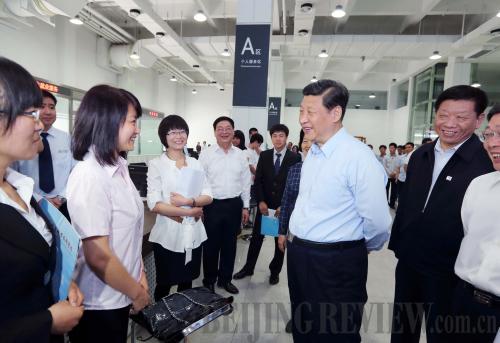|
 |
|
BEST WISHES: Chinese President Xi Jinping encourages college students to be ambitious as well as down-to-earth in seeking employment at a job fair in Tianjin on May 14 (LANG HONGGUANG) |
Yan Zhaolong, in charge of Nanjing Andemen Job Fair for Migrant Workers, is inundated with college students consulting him for opportunities as migrants. The job fair ended setting up a window specifically for graduates.
"I feel sad about this," said Yan, who is over 40 years old. "In my days, college students were people that we should admire. I never thought they could end up like this."
To market
"If I could start college over..." prefaces an online photographic phenomenon. Students from Hangzhou Electronic Science and Technology University in Zhejiang Province stand in front of cameras holding papers written about their hypothetical second chances as freshmen.
Wishes include changing majors, reading more books, going to the lab more, taking part in more activities on campus, playing fewer computer games or going abroad for further study.
"I don't think the knowledge we've learned in college is of practical use and neither do my classmates," said a netizen who calls himself Ballack, a Hunan University senior who still hadn't found a job as of May 26.
"College life is too easy as it is much easier to graduate than to be enrolled. You won't learn anything without self-control. The teachers won't care that much," said Liu Tongxue, a student at Shandong Normal University in Shandong Province who said that her contemporaries are self-centered yet fail to consider their individual competence for the most desirable employment opportunities.
Guo Hengyu, a sophomore at Suzhou University of Science and Technology in Jiangsu Province, has been hunting for a job since freshman year. "We have to prepare early and talk to the employers more to learn what kind of people they want. I'm worried what it will be like when I graduate."
Li Siyao, a graduate from Laizhou No. 1 Middle School in Laizhou, Shandong, who barely passed the college entrance exam by 37 points last year, eschewed university to attend a vocational school—Shandong Property Management College.
"I made this decision on the serious employment situation and I think this can only get worse in the following years," said Li. "I'd rather learn some vocational skills that can quickly be used in the market. For the degree, I can get that through self-taught exams if I want."
Postgraduates face an even worse situation, according to Tu Minxia, Director of the Guangzhou-Hong Kong-Macao Youngsters Research Institute.
"Many college students choose to stay in universities for further study to avoid the serious employment situation but find out things can only get worse. The job market is especially unkind to women with postgraduate degrees," said Tu.
The grim situation, though, dragged some students out of the ivy tower to face reality. Liao Weidong, a junior material chemistry major at Shanghai's Fudan University, one of the top universities in China, is already looking for work.
Liao goes off campus for his internship every weekend and always works until midnight. As a leader of the student union of the university, he frequently organizes students for mock job interviews and job-hunting lectures.
"Even though we come from a top university, we can't just take for granted that we will be well-received by the job market," said Liao.
Meng Xiangbo, a 23-year-old economics major at Anhui University in Anhui Province, opened a pet care shop near campus in 2012. It made about 70,000 yuan ($11,403) in its first year, and Meng plans to expand.
"Opportunities are everywhere as long as you can work hard," said Meng. "I think the future for college students to start up business is very promising."
But Meng also admitted that it is very hard for the college startups to get loans from the bank. He still hasn't told his parents that he is running his own business.
"In Chinese parents' eyes, the best choice is always to get a well-paid job in a decent company. Running one's own business would be regarded as risky and not on the right track," said Meng.
"The number of college students will be even more in the future, so we should deal with this at the root," said Ding Dajian, a researcher with the China Institute for Employment Research. "The core is to develop the private companies and make some preferential policies for college startups."
Email us at: yuanyuan@bjreview.com | 